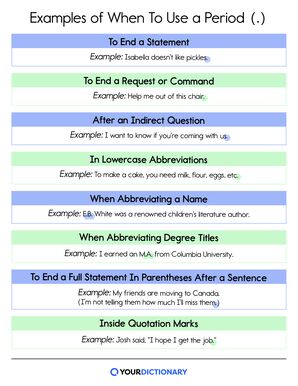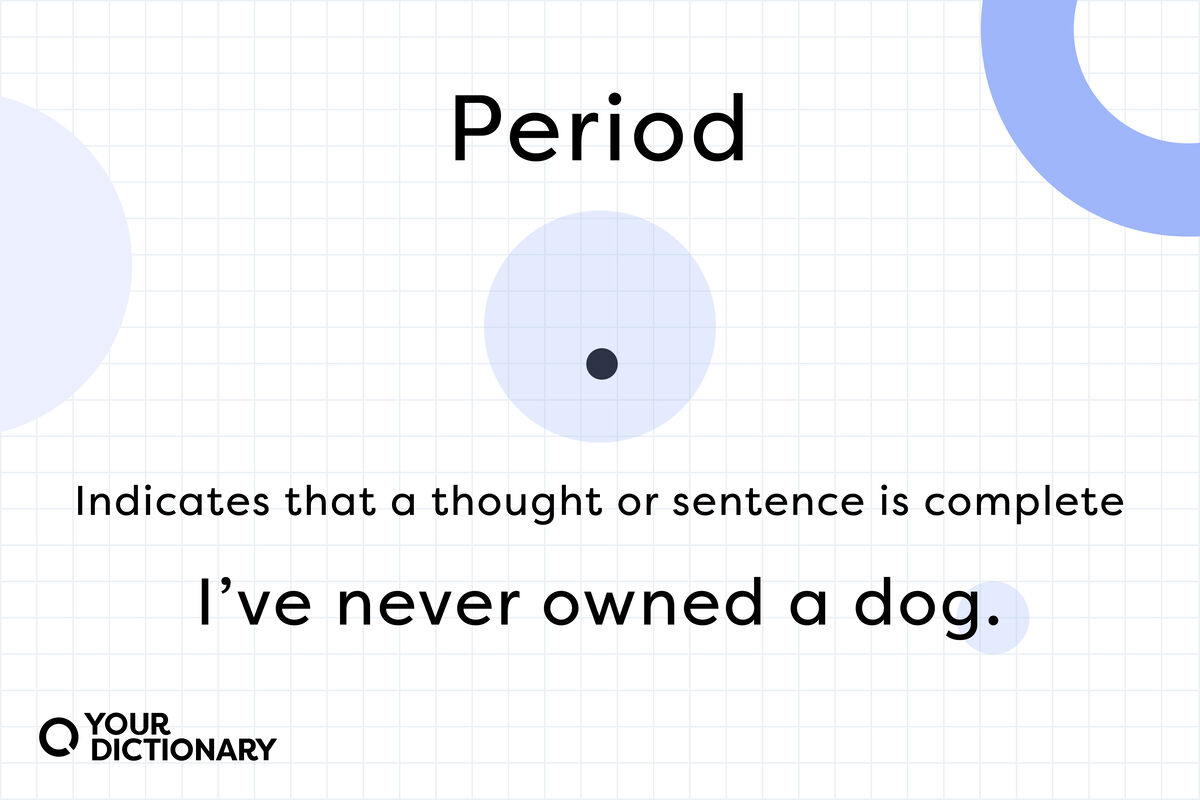

A period may just be a little dot at the end of your sentence, but it’s a lot more powerful than it looks. One single period punctuation mark can end an entire sentence, interrupt a complete thought, and even eliminate multiple letters from an abbreviation. But before you unleash these potent punctuation marks into your writing, you need to learn the rules of using periods — otherwise, they could cause more harm than good.
What Is a Period?
A period is one of the 14 punctuation marks in English writing. Also known as a full stop or a period mark, a period indicates that a thought or sentence is complete. It’s one of the three end punctuation marks, along with exclamation points and question marks.
A period looks like a small dot on the bottom of a line (.), and it comes after the last letter in a sentence.
- I’ve never owned a dog.
- Let’s try that new sushi place.
- Nancy wants to know if you’re coming to the party.
You can also use a period to abbreviate words and phrases.
- 5 p.m.
- Dr. Taylor
- Claremont St.
When To Use a Period
Using a period seems pretty straightforward if you’re just thinking about sentences and abbreviations. But what kinds of sentences require periods, and why don’t you include periods in words like FBI or ASAP?

Use a Period To End a Statement
Periods indicate the end of a declarative sentence, which makes a declaration or a statement. Declarative sentences provide information with a calm, informative tone.
- Isabella doesn't like pickles.
- My dog’s name is Murphy, but he never comes when I call him.
- We’ve never been to Colorado.
You can make these declarative sentences exclamatory by adding an exclamation point (Isabella doesn’t like pickles!), but that changes the tone of the sentence from calm and straightforward to excited, angry, or another strong emotion.
Use a Period To End a Request or Command
Periods also come at the end of imperative sentences, which make requests or give commands.
- Help me out of this chair.
- Please text me if you have any questions.
- Don’t drum on the staircase banister.
Imperative sentences can also contain exclamation points (Help me out of this chair!) if you want to add a sense of urgency to your words. But otherwise, these sentences are grammatically correct with a period.
Use a Period After an Indirect Question
Not every question is an interrogative sentence, which always ends in a question mark. Indirect questions are hidden inside statements — in which case, they end in a period.
- I want to know if you’re coming with us. (Direct question: Are you coming with us?)
- Shelley asked if we could pick up some pizza for her. (Direct question: Can we pick up some pizza for Shelley?)
- The question was whether anyone would still vote for him. (Direct question: Will anyone still vote for him?)
Use a Period in Lowercase Abbreviations
Periods stand for omitted letters in abbreviations. When an abbreviation includes lowercase letters, it typically also includes periods. This rule includes most honorific titles, such as Mr. or Dr. (except in British English).
- To make a cake, you need milk, flour, eggs, etc.
- We need to talk in private (i.e., away from your friends).
- Dr. Martin Luther King, Jr. was an influential civil rights leader.
Use a Period When Abbreviating a Name
If someone abbreviates part of their name, use periods to indicate that some letters are missing from certain initials. The same rule applies for a period after a middle initial.
- J.K. Rowling wrote several books after finishing the Harry Potter series.
- E.B. White was a renowned children’s literature author.
- I remember when John F. Kennedy was elected.
Use a Period When Abbreviating Degree Titles
When shortening the title of an academic or professional degree, use periods. Note that this rule can depend on the situation, so double-check with your style guide.
- I earned an M.A. from Columbia University.
- This job requires at least a B.S. and one year of work experience.
- His full title is Dr. Andrew Sherman, D.D.S.
Should Periods Go Inside or Outside Parentheses?
When a parenthetical statement is non-essential, and falls in the middle of the sentence, no period is needed inside the parentheses.
- I applied to UCLA (my dream school) and USC.
- My friends (whom I’ve known since elementary school) are moving to Canada.
But when the statement inside the parentheses is a full sentence and comes after the end punctuation of the sentence, it does need its own punctuation.
- I applied to UCLA and USC. (UCLA has been my dream school since I was a child.)
- My friends are moving to Canada. (I’m not telling them how much I’ll miss them.)
Do Periods Go Inside or Outside Quotation Marks?
Some writers get confused about periods and quotation marks because question marks and exclamation points sometimes belong outside a quote. But in American English, periods, like commas, always belong inside quotation marks. (In British English, only full sentences inside quotation marks get a period.)
- Josh said, “I hope I get the job.”
- My friend chanted “Rachel, Rachel, Rachel.”
- He explained, “I was late because I was helping my mom.”
When Not To Use a Period
Knowing when not to use a period can be just as important as knowing when one belongs. In some cases, an erroneous period can change the meaning of your entire sentence.
Don’t Use a Period to Break Up a Sentence
Some sentences feel like they need a pause right in the middle. But that doesn’t mean you need a period — in these cases, a comma (or no punctuation mark) is probably the right move.
- Incorrect - The cat jumped. And landed on his feet.
- Correct - The cat jumped and landed on his feet.
- Incorrect - I’ll have the steak. Well done.
- Correct - I’ll have the steak, well done.
Don’t Use a Period After Another Punctuation Mark
If your sentence ends with another punctuation mark, you don’t need to add a period to the end anymore.
- Incorrect - I love the Beatles’ song “Help!”.
- Correct - I love the Beatles’ song “Help!”
- Incorrect - We’re going to dinner with Mike, Paul, Lilly, et al..
- Correct - We’re going to dinner with Mike, Paul, Lilly, et al.
Don’t Use a Period in Uppercase Abbreviations and Acronyms
When an abbreviation or an acronym contains all uppercase letters, it doesn’t usually include periods.
- Please send this form out ASAP so we can make a plan.
- FYI, we’re not open on Mondays.
- Herman applied to NASA and JPL right out of college.
Don’t Use a Period in Most Scientific or Mathematical Abbreviations
Abbreviations for measurements, scientific terms, or math terms don’t need periods either. The only measurement that requires a period is in. for inch, because it looks like the word in otherwise.
- The kittens eat 3 oz a day and now weigh 2 lbs each.
- What class do you have for 1st period?
- Some dog breeds can hear up to 40 kHz when they’re young.
Don’t Use Periods After Fragments in Bullet Points
When listing items in a bulleted list, you don’t need to use periods unless the items are all in complete sentences.
- We need to bring:
- sleeping bags
- tents
- a camp stove
- a swimsuit
More Particular Period Procedures
- In the U.K. and the U.S., we use a period when writing out decimals, while many other countries use a comma instead.
- When using a period in a URL, it’s called a dot, not a period (as in “yourdictionary(dot)com”).
- Use periods when writing U.S. (if you’re using APA or AP style), but not when writing USA.
- Abbreviations for historical eras (B.C., A.D., B.C.E., and C.E.) use periods in AP Style, while they don’t use periods in Chicago Manual of Style (BC, AD, BCE, and CE)
- Ellipses, which look like three periods in a row, can end a sentence if the sentence is trailing off.
- Add only one space after a period, not two (even if you learned it the other way).
- It’s okay to use a period in your texts, but it might make your friends nervous.
Be Consistent — Period
Because there are so many different ways to use periods, the number one rule is to use them consistently. Be sure you’re following proper punctuation rules when using periods and sentences, but when it comes to abbreviations, make sure you’re applying the same rule to each abbreviation in your writing.